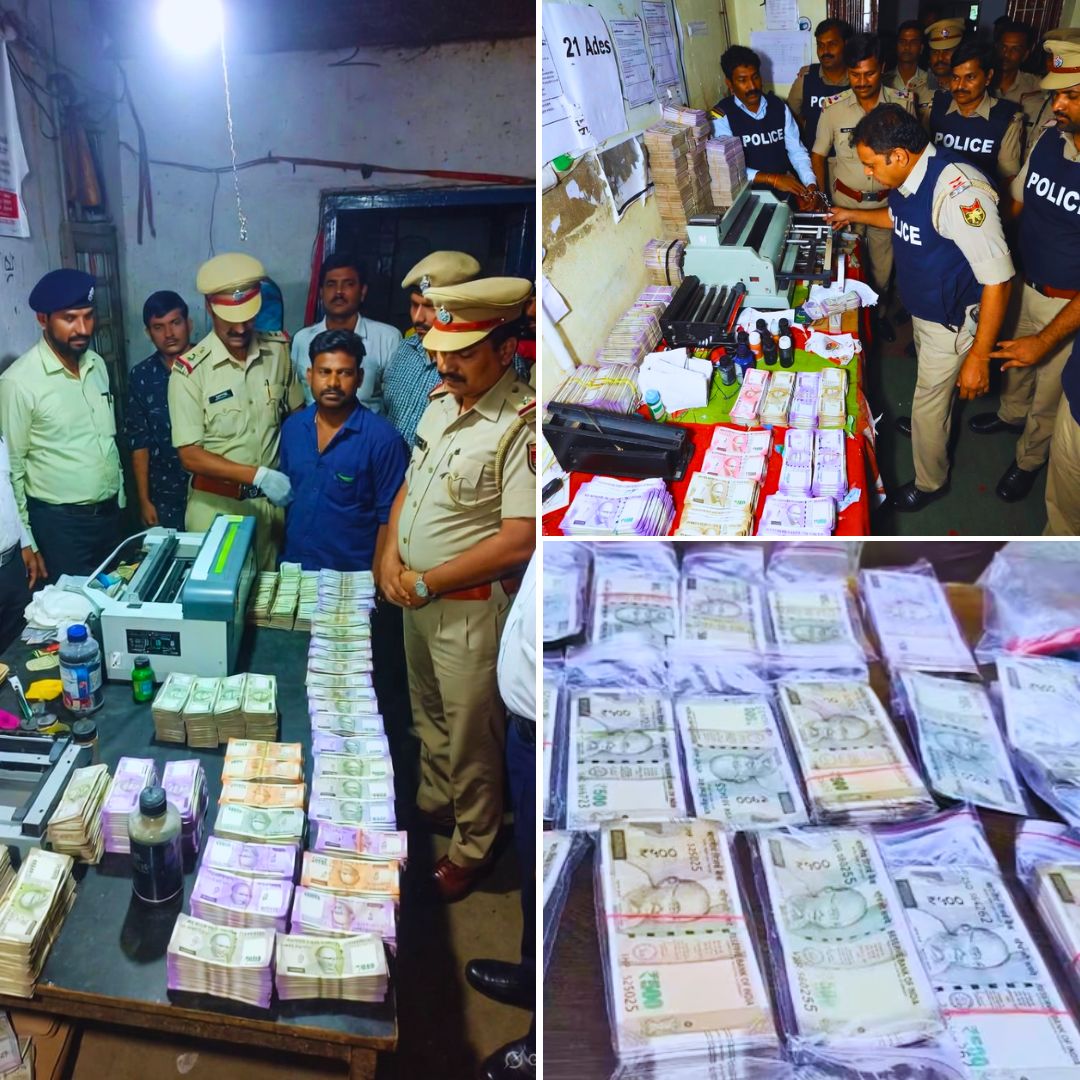Bhopal police arrested 21-year-old Vivek Yadav for running a sophisticated counterfeit currency operation from his rented home in the Karond area. Acting on a tip-off on November 14, officials caught Vivek attempting to circulate fake Rs 500 notes in the Nizamuddin area.
A search of his residence yielded Rs 2.25 lakh in counterfeit notes, along with high-end printing machinery, specialised paper, inks, and other materials used to produce fake currency.
Vivek admitted to circulating Rs 5–6 lakh worth of fake notes over the past year, primarily targeting small shops. Investigations continue into whether he was acting alone or part of a larger network.
Bhopal Police Bust One-Man Counterfeit Currency Factory
In a case that reveals both the ingenuity and risks posed by accessible technology, police in Bhopal have dismantled a counterfeit note-printing racket operated singlehandedly by a young man barely out of his teens.
Vivek Yadav, who has only completed up to the 10th standard, taught himself the art of producing high-quality fake currency by watching online videos, reading specialised books, and leveraging experience from a previous job in a printing press.
Additional DCP Zone-2 Gautam Solanki recounted how a police tip-off on the suspicious circulation of fake Rs 500 notes near Nizamuddin led to Vivek’s arrest. “He was found with 23 counterfeit notes that were indistinguishable at first glance from genuine currency,” said Solanki.
The police then raided Vivek’s rented house, discovering a veritable fake note factory including colour laser printers, precision scanners, imported glossy paper, special inks, cutting blades, design software, and semi-finished stacks of counterfeit notes.
Vivek’s explanation during interrogation reflected his methodical approach: He scanned genuine notes, digitally corrected security features such as watermarks and security threads, printed the designs on special paper resembling the texture of real notes, and manually cut and pasted fake RBI stripes to produce notes that fooled many shopkeepers.
Police also found his mobile phone filled with detailed videos and photos documenting the printing process, revealing his dedication and know-how.
A Sophisticated Operation by a Self-Taught Printer
Despite his limited formal education, Vivek’s operation was technologically adept and meticulously planned. Authorities found evidence he sourced high-quality materials-specialised paper, dyes, hot-stamping foils, and inks-from online markets and local vendors to increase the authenticity of his counterfeit notes.
These materials are typically difficult for the average person to obtain or use without proper expertise.
Vivek admitted to conducting his business primarily in local markets across Bhopal, deploying his fake notes mostly in small grocery and paan shops where shopkeepers are less likely to detect forged currency quickly. He confessed to circulating between Rs 5 lakh and Rs 6 lakh in counterfeit notes over approximately one year.
Arrested after a shopkeeper grew suspicious upon receiving two fake notes repeatedly from Vivek, the police have now launched formal investigations to understand whether Vivek had any accomplices or if this was a solo venture fueled by self-education and technology.
Context: Rising Challenges of Counterfeit Currency in Madhya Pradesh
This case is not an isolated incident; Madhya Pradesh has seen multiple counterfeit currency busts recently, often coinciding with heightened economic activity during festive and market seasons when cash transactions spike. Authorities note that the availability of advanced printing technology and online instructional content has lowered barriers for individuals intent on producing fake currency.
Even young men with only basic schooling, like Vivek, now have access to tools and knowledge that once required expert knowledge and specialised printing facilities.
Counterfeit currency impacts more than just the economy-small businesses are often the first victims, as an influx of fake notes causes losses and mistrust in local economies.
Law enforcement agencies are increasingly relying on community vigilance and tips to identify suspicious activity quickly and prevent fake notes from circulating widely.
Law Enforcement and Community Cooperation Are Key
The Bhopal police’s quick response to the tip-off and subsequent trap exemplifies how community cooperation can aid law enforcement. Additional DCP Gautam Solanki emphasised the importance of public awareness and vigilance.
“It is through timely information from citizens that we could act swiftly and apprehend the culprit before more damage was done,” he said. Authorities have also urged residents and shopkeepers to be alert to counterfeit notes and report suspicious activity immediately.
Furthermore, the case highlights the complexity of modern crimes involving technology. While computers, printers, and online resources empower many for positive uses, they also pose challenges when misused for criminal purposes such as counterfeiting.
This dual-use dilemma calls for an ethical approach to digital literacy and stricter monitoring of potentially sensitive materials without stifling innovation.
The Logical Indian’s Perspective
This incident from Bhopal signals the need for holistic action against counterfeit currency crimes-one that balances technology’s benefits with stringent law enforcement, community engagement, and public education.
The Logical Indian advocates fostering an informed society that can detect and deter such offenses through awareness rather than fear or suspicion.
Ultimately, preventing counterfeit circulation is a shared responsibility requiring cooperation among citizens, law enforcement, and policymaking bodies to safeguard economic integrity and social trust.
Encouraging ethical use of technology and supporting victims, mainly small business owners affected by fake notes, is essential to building peaceful, resilient communities.












